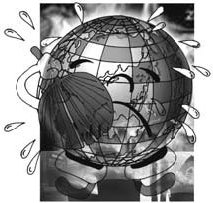Things are easily said than done. And one of the easiest things in the global environmental forum today is to blame this or that country for its emission record.

Having criticized China's own problems, this columnist thinks he deserves the right to advise the forthcoming UN Climate Change Conference in Bali, scheduled to kick off next week, to focus on the real issues and solutions rather than letting fear-mongers, ideology preachers, and foreigner-haters hijack the platform.
Since 1750, as the IPCC (the UN commissioned Intergovernmental Panel on Climate Change) clearly states, human activities have built up the environmental crisis we now face. Even with a minimum level of education, people should all know what that is supposed to mean.
It really does not make much sense to say this or that country has not done enough good. When the problem is still there and threatening everyone on Earth, who is entitled to point fingers?
One of the things the scientists' panel do not point out is that among countries with the best efforts as they claim in environmental protection, most import goods from, and at the same time, have investment interests in the kind of activities that the world has known since the industrial revolution.
None of the best-record countries is willing, as seen from their political agenda, to revert to complete self-reliance. How would a cynical person view this? How fair is it for people who can afford to shop in wind-powered shopping arcades for cheap imports from countries where even coal stoves or electrical fans are a luxury - and at the same time complain about the pollution of these countries?
How fair is it for countries relying on cheap imports while still reporting rising greenhouse gas emissions, point the finger at emerging market economies which have indeed made emission cuts.
There have been a lot of press reports about how, last year, most of the Chinese provinces failed to meet their emission target cuts - with the exception of the Beijing municipality.
But they only focused on percentage terms, while in real terms, it was Guangdong Province on the southern coast, also where most of China exports originate, that was the lowest emitter among all provinces.
It was only the first year China reported emissions in a province-by-province breakdown in a five-year program aimed at a 20 percent emission cut for the whole economy. And the first year's failure does not mean the whole program is beyond salvation.

It is silly when some overseas commentators cite this to suggest that the failure of so many provinces to meet their emission cut targets shows Beijing's lack of effective rule.
The truth is that in the five-year program, most provinces did manage to lower their use of energy and cut emissions but fell short of the targets. In some of the provinces there are still plenty people who cannot afford heating in winter and air conditioning in the summer. Some may not even have access to a power grid, living in a way not so distant from several centuries ago. Every bit of their efforts in self-restraint should be appreciated.
In contrast, in some rich countries where there are always people criticizing other polluters, their own emissions have shown no sign of decreasing.
E-mail: younuo@chinadaily.com.cn
(China Daily 11/26/2007 page4)

